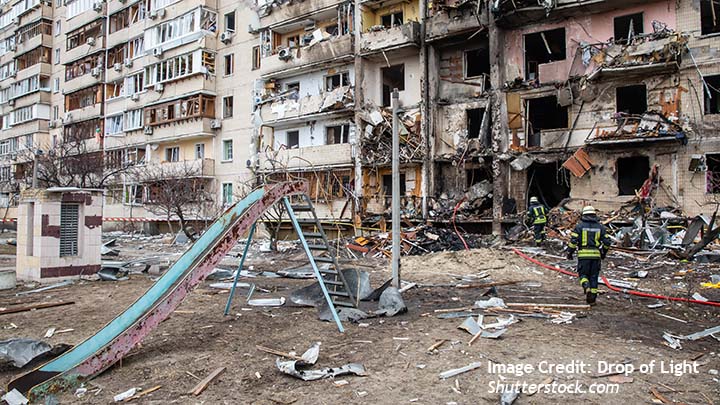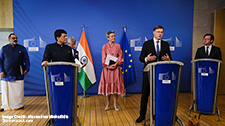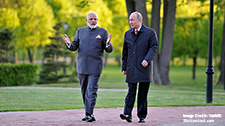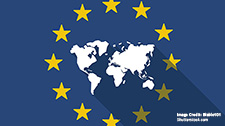Keeping Everyone Happy: India Balances Historical Ties with Russia with its National Interest

Jagannath Panda
Almost one year into the Russian President Vladimir Putin’s invasion of Ukraine, and Russia’s military offensive against Ukraine shows no sign of waning: the fighting continues, and so does the scale of the human suffering. Unfortunately, however gruesome or morally repugnant the act of war, international solidarity is a tough act to follow. And so it has been during the Ukraine war – the undeniable repercussions on the global economy and security landscape notwithstanding.
The US-led Western democracies, along with a resurgent North Atlantic Treaty Organisation (NATO), have shown a united front against the “permanent” enemy Russia, but the non-Western democracies have been divided. Japan, South Korea and Australia (all of the treaty allies of the United States) have unequivocally sanctioned Russia, while India, Brazil and Indonesia, among others, have chosen the so-called new “non-aligned” route, championing the cause of the Global South.
Among this latter group, India has emerged as the centrepiece of the autocracies versus democracies debate in this rekindled new Cold War scenario. The reasons are multi-fold: self-proclaimed voice of the Global South; an ally of the West; Russia’s historical partner; China’s predominant regional rival; and an established democracy with deep-seated non-aligned roots.
Nonetheless, critics have unceremoniously dumped India with the authoritarian states of China, Iran, Belarus and North Korea for refusing to shape or alter its “independent” Russian stance to the Western standards; and which they deem has (financially and morally) fuelled Putin’s brutal war. However, such a sanctimonious binary worldview not only is a rather simplistic take on complex diplomatic tactics, as is obvious, but also highlights why the emerging world continues to distrust Western liberal leadership with its blinkered perspective. Japan’s Prime Minister Fumio Kishida’s warning about neglecting the emerging world based on non-convergent values is a timely reminder.
For India, contrary to what such criticisms allege, perhaps the most prominent takeaway from the war is its expansive international outlook: Rather than limit its support to Russia on purely historical bonhomie, India has in fact found momentum for its already burgeoning multi-aligned (and “pointed”) diplomacy. Its current foreign policy has decidedly evolved to lessen the impact of being caught up in geopolitical dilemmas – be it the US-China rivalry in the Indo-Pacific or the West-Russia antagonism. India recognises the perils of overreliance on Russia as a security partner and the need for New Delhi to diversify its security partnerships.
Hence, India’s multifarious economic, defence and technological cooperation with the US, Japan, Australia, the European Union (EU) and its member states, Vietnam, Indonesia, South Korea, Central Asian states, and others must be seen through this lens. In addition, India is asserting stakes in not just US-led mechanisms such as the Quadrilateral Security Dialogue (Quad) in the Indo-Pacific or the newly created I2U2 (India, Israel, the UAE and the US) in West Asia, but also Russia-inclusive forums such as the Shanghai Cooperation Organisation (SCO) and the BRICS (Brazil, Russia, India, China, South Africa).
Regardless, India’s response to the Russia-Ukraine war, including the belated “no time for war” condemnation by Prime Minister Narendra Modi, has been under the spotlight. But if the increased cooperation with “like-minded” partners on the Indo-Pacific is anything to go by, India’s national interest-driven stance on Russia has found grudging acceptability too, if not resonance. For example, while India has strengthened defence cooperation with the US and the EU post the invasion, US allies Japan and South Korea have included India as a key partner in their recently released respective strategic documents or international outlook. At the same time, it is reasonable to question the long-term viability of India’s West-Russia strategic hedging, and particularly the impact on India if Russia loses.
Importantly, India’s response and its mixed reception have already raised several introspective questions for Indian lawmakers: How far is Indian foreign policy reliant on actions of its major power partners and adversaries? How can India promote its independent foreign geopolitical posture amid new geopolitical alliances (like the Sino-Russian “no limits” partnership) and the contradicting interests of its partners?
To some extent, New Delhi is already pivoting and diversifying its partnerships, as well as deepening its focus on a self-reliant India, in both the economic and security domains. This has reiterated India’s belief in its current the path of strengthening atmanirbharta and creating space for national interests within value-based “like-minded” partnerships (highlighted in its Quad dealings).
Moreover, the Ukraine war has been a valuable case in demonstrating the changing nature and character of warfare and global power dynamics. Importantly, it is also a watershed event that has boosted the transition into multipolarity, which has added a new dimension to the power balance in the relationships between established and emerging powers. What has surprised the world – including India – about Russia’s invasion is how Ukraine has managed to push back against Russia, in what Putin had originally estimated as a swift win for Russia.
New Delhi must be carefully observing these developments to understand how Ukraine, as a small power, has levelled the playing field, in order to draw lessons for a potential conflict vis-à-vis China. China is a major power in terms of its size, wealth and reach; its rapid economic growth has been accompanied by an exponential rise in its military capabilities. While India remains a formidable military power (it ranks fourth in the Global Firepower Index), it cannot match China’s defence spending and size of armed forces owing to economic limitations. As a developing nation, India must equally focus on allocating resources for socio-economic growth and prosperity.
In this context, the Indian Defence Minister Rajnath Singh has already stressed on the necessity to expedite self-reliance “without dependencies” as a guarantor of national security and prosperity in the wake of the Ukraine war. The stress on “indigenisation” in defence production is particularly important in the long term as India is overly dependent on Russia for military equipment.
Moreover, in the current era, new technologies, as well as a harmony of outward-looking “like-minded” partnerships and an inward-looking self-reliance, can tilt the balance of power. Thus, India’s policy decisions, so far, of deftly encouraging security cooperation with the varied partners – via bilaterals, multilateral forums, and minilaterals – without compromising the strategic autonomy at play seems to be the right trajectory.
In particular, India’s distinctive stance of balancing between Russia and the West – refusing to outright call out Russia on its military actions and continuing to pursue energy/arms trade while engaging the US and its allies with multifaceted cooperation in the Indo-Pacific – has rankled the West, if not adversely affected the relations.
Yet, despite pressure from the West, India has remained steadfast in what its officials call a “clear”, “credible” position on the Russia-Ukraine war, while others have coined several permutations of neutrality (e.g. “proactive” or “formal neutrality”): Without condemning Russia directly, New Delhi has called for an immediate cessation of violence, a return to dialogue and respect for sovereignty, territorial integrity and the UN Charter. Yet the high-sounding rhetoric is underpinned by pragmatism and regional compulsions.
Undoubtedly, Russia’s importance to India stems from the latter’s need to keep Russia in good humour: not just as a critical weapons supplier but as a counter to Moscow’s strategic convergence with China, at a time when India is facing a growing Chinese threat at its border – as also to showcase its leverage to the US. Notwithstanding the difficulties, India has been able to effectively communicate its compulsions and position itself as a bridge builder, owing to its distinct relations with both Russia and the West.
With Europe in particular, India’s foreign policy has certainly shown a shift towards deeper partnerships, including with the UK, the EU and its member states – Europe’s souring of ties with China is turning out to be a big factor. India regards the EU as a “natural ally” in its quest to achieve a free, open, inclusive and rules-based Indo-Pacific order, as also for regional strategic balance.
Post the Russian invasion, Modi’s multiple visits to Europe and the European Commission President Ursula von Leyen’s trip to India in 2022 intensified the Europe-India strategic engagement including convergence on critical issues. Notably, the strategic convergence with France in multiple domains has been an added advantage. While there are certainly several areas of limitation (including their different positions on Russia), New Delhi recognises the India-Europe unfulfilled potential and the need to elevate ties to build an effective partnership that can script the regional future. How far India and Europe can build a comprehensive strategic partnership will depend on sustaining the political will while navigating their respective threat perceptions (vis-à-vis Russia and China), as well as the US-China great power competition.
The criticism and introspection notwithstanding, thus far, as the geopolitical uncertainties due to the Ukraine war have enabled India to assert its growing global profile, India has effectively shaped its foreign policy to not only secure national interests but also ensure inclusive regional and global development.
This commentary by Jagannath Panda is a part of ISPI’s anniversary dossier on Ukraine war, titled “Ukraine: The War That Changed the World, One Year On“, published on February 21, 2023.
Related Publications
-
ISDP Annual Report 2023
ISDP’s Annual Report for the year 2023. We look back on 2023, a year in which tensions and conflicts captured the strategic space in ISDP’s focus areas, making headlines around […]
-
Trade, Connectivity and Supply Chains in EU-India Relations
In the decade and a half since 2007 when the EU and India first started their FTA negotiations, the world economic order has undergone a sea change. During that period, […]
-
The Limitations of India and Russia’s Transactional Relationship
Since Russia’s unprovoked invasion of Ukraine in February 2022, it might seem as though ties between India and Russia have strengthened. While much of the West isolated Russia, India-Russia energy […]
-
India-Middle East-Europe Economic Corridor: Will It Get Subsumed by Its Grand Vision?
The recently concluded Group of Twenty (G20) Summit in New Delhi under India’s presidency was, undoubtedly, a crowning moment for India. From providing the G20 with new relevance among the […]
-
Quad Plus EU: A Viable Option for the Times?
Today, the primary Indo-Pacific contest is not just about the China-US hegemony. It also involves a range of so-called “middle powers” – including Australia, France, Germany, India, Indonesia, Italy, Japan, […]




